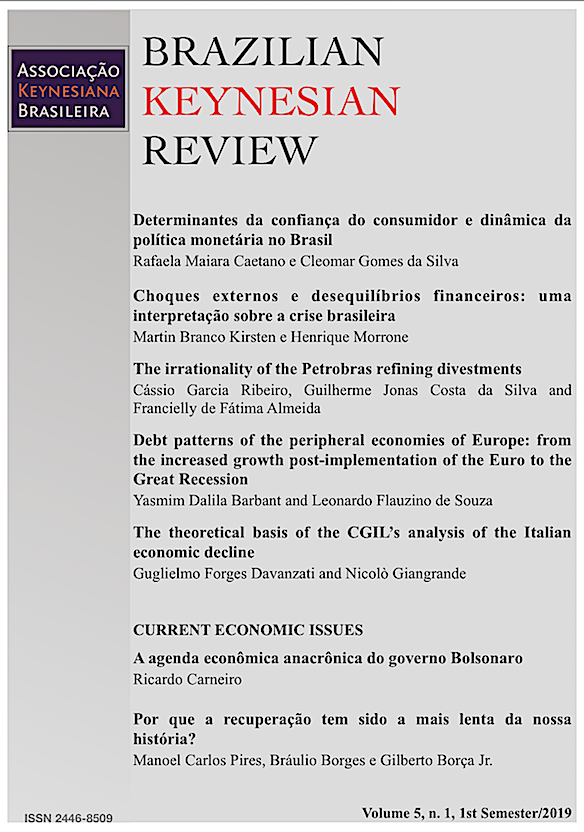Por que a recuperação tem sido a mais lenta de nossa história?
Resumo
Este artigo discute porquê a retomada cíclica da economia brasileira tem sido atipicamente fraca no ciclo atual, mesmo quando comparada com outros episódios tão severos, prolongados e conturbados, como aqueles de 1981-83 e 1989-92. A primeira parte faz um dimensionamento da crise brasileira em termos de padrões históricos, além de comparações com as recessões de algumas das principais economias avançadas no pós-crise de 2008. A segunda se dedica a uma análise mais pormenorizada da posição cíclica da economia brasileira, buscando avaliar o comportamento de oferta e demanda agregadas e se a política econômica respondeu de forma adequada a esse quadro. A última seção traz algumas considerações finais, apresentado algumas sugestões de prescrição de política econômica.
Downloads
Referências
Ball, L. & Tchaidze, R. (2002). The FED and the new economy. American Economic Review, 92(2), 108-114. doi: 10.1257/000282802320189096.
Barbosa, F., Camelo, F. & Joao, I. (2016). A taxa de juros natural e a regra de Taylor: 2003-2015. Revista Brasileira de Economia, 70(4), 399-417. doi: 10.5935/0034-7140.20160021.
Barboza, R. (2019). A década frustrada. Jornal Valor Econômico. Disponível em <https://www.valor.com.br/opiniao/6205137/decada-frustrada>
BCB - Banco Central Brasil (2019). Relatório de Inflação, 21(2), 1-59, Brasília: Banco Central do Brasil. Disponível em: <https://www.bcb.gov.br/
content/publicacoes/ri/201906/ri201906p.pdf>
Blanchard, O. (2017). Should we get rid of the Natural Rate Hypothesis? NBER Working Paper, 24057, National Bureau of Economic Research, Cambridge, MA. doi: 10.3386/w24057.
Blanchard, O. & Summers, L. (1986). Hysteresis and European unemployment problem. In: Fischer, S. NBER Macroeconomics Annual, v.1. National Bureau of Economic Research, Cambridge, MA.
Borges, B. (2019). Resultado fiscal estrutural brasileiro encerrou 2018 em terreno ligeiramente positivo, pela primeira vez desde 2012. Blog do Ibre. Disponível em <https://blogdoibre.fgv.br/posts/resultado-fiscal-estrutural-brasileiro-encerrou-2018-em-terreno-ligeiramente-positivo-pela>
Borça Jr., G., Barboza, R. & Furtado, M. (2019). A recuperação do PIB brasileiro em recessões: uma visão comparativa. Blog do Ibre. Disponível em <https://blogdoibre.fgv.br/posts/recuperacao-do-pib-brasileiro-em-recessoes-uma-visao-comparativa>
Braga, J. & Lara, F. (2019). De onde virá a demanda que justificará a recuperação do investimento? Excedente, Grupo de Economia Política da UFRJ. Disponível em: <http://www.excedente.org/blog/de-onde-vira-a-demanda-que-justificara-a-recuperacao-do-investimento/>
Carvalho, C., Nechio, F. & Tristão, T. (2018). Taylor rule estimation by OLS. Federal Reserve Bank of San Franscisco Working Paper, 2018-11, 1-39. doi: 10.24148/wp2018-11.
CODACE (2017). Comitê de Datação de Ciclos Econômicos. FGV: São Paulo. Disponível em <https://portalibre.fgv.br/data/files/F3/C1/F8/E8/A18F66108DDC4E66CA
B7A8/Comite%20de%20Data__o%20de%20Ciclos%20Econ_micos%20-%20Comunicado%20de%2030_10_2017%20_1_.pdf>
DeLong, B. & Summers, L. (1988). How does macroeconomic policy affect output? Brooking Papers on Economic Activity, Brookings Institution, 2, 433-494.
International Monetary Fund (2019). Article IV Consultation Press Release, Staff Report and statement by the executive director for Brazil, IMF Country Report, 19/242, 1-14, Washington, DC: IMF.
Khan, L. (2010). The long-term labor market consequences of graduating from college in a bad economy. Labour Economics, 17(2), 303-316.
Montero, P. (2019). PIB per capita caminha para ter variação zero na década. Valor Econômico, p. A5. Disponível em: <https://glo.bo/2kODKgU>
Pastore, A., Pinotti, M., Gazzano, M. & Magalhães, P. (2019). A Depressão Depois da Recessão. Informe Especial A.C. Pastore Associados.
Phelps, E. (1972). Inflation Policy and Unemployment Theory. New York: Norton.
Walentin, K. & Westermark, A. (2018). Learning on the job and the cost of business cycle. Sveriges Riskbank Working Paper, 353, Sveriges Riskbank, Estocolmo. Disponível em <https://www.riksbank.se/globalassets/media/rapporter/
working-papers/2018/no.-353-learning-on-the-job-and-the-cost-of-business-cycles>
Secretaria de Política Econômica – Ministério da Economia (2019). Boletim Resultado Fiscal Estrutural – 2018. Brasília: SPE.
Williams, J. (2013). Lessons from the Financial Crisis for Unconventional Monetary Policy. Panel discussion at the NBER Conference. Disponível em <https://www.frbsf.org/our-district/files/Williams-Lessons-from-the-Financial-Crisis-for-Unconventional-Monetary-Policy.pdf>
Copyright (c) 2019 Manoel Carlos Pires, Bráulio Borges, Gilberto Borça Jr.

This work is licensed under a Creative Commons Attribution 4.0 International License.
- Autores mantém os direitos autorais e concedem à revista o direito de primeira publicação, com o trabalho simultaneamente licenciado sob a Licença Creative Commons Attribution que permite o compartilhamento do trabalho com reconhecimento da autoria e publicação inicial nesta revista.
- Autores têm autorização para assumir contratos adicionais separadamente, para distribuição não-exclusiva da versão do trabalho publicada nesta revista (ex.: publicar em repositório institucional ou como capítulo de livro), com reconhecimento de autoria e publicação inicial nesta revista.
- Autores têm permissão e são estimulados a publicar e distribuir seu trabalho online (ex.: em repositórios institucionais ou na sua página pessoal) a qualquer ponto antes ou durante o processo editorial, já que isso pode gerar alterações produtivas, bem como aumentar o impacto e a citação do trabalho publicado (Veja O Efeito do Acesso Livre).


